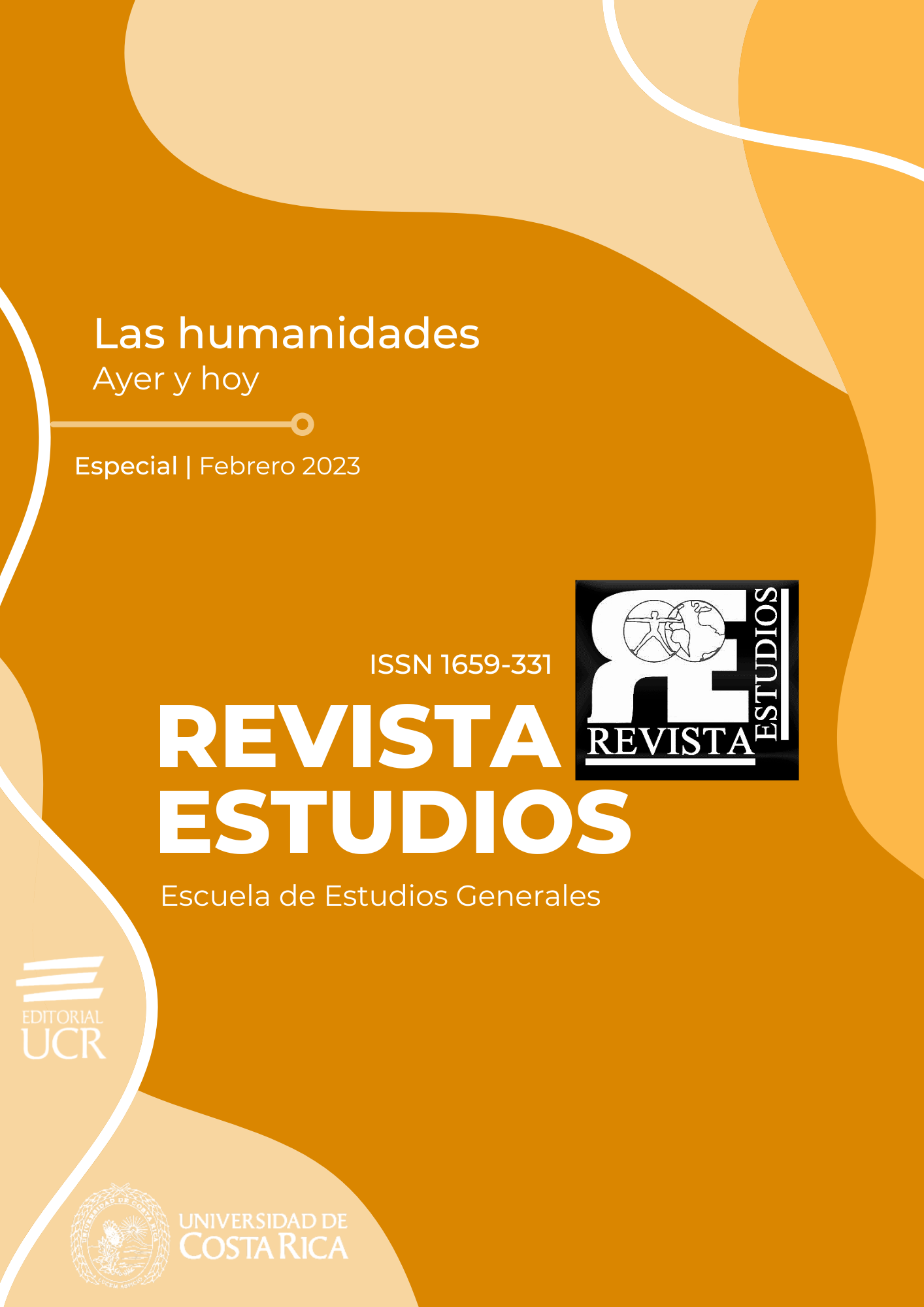Abstract
This article presents an approximation to violence as a social micro-space in the novel the Ephesiacs by Xenophon of Ephesus]. Romance and adventure novels are born in an urban geographical setting. These stories have sudden changes of scenery and geography with internal and external spaces. In the internal space, appear the themes and motifs that allow the development of the argument [the themes and motifs that allow the development of the argument appear]. In the external space, can see a space in which adventures take place in cities of the Hellenistic world. The micro-space, in the text, is formed through the social space from the relationships established by the protagonists with the people of these places. Precisely, in the micro-space, the motif of love is intertwined with seduction, chastity, fidelity, separation as well as with violence and slavery. The latter constitutes a reason for constant violence for the young protagonists who defend their fidelity and chastity threatened in hostile environments and alien to the Hellenic world.References
Bierl, A. (2020). Space in Xenophon of Ephesus:Love Dreams, and Dissemination.The Center of Hellenic Studies. https://chs.harvard.edu/curated-article/anton-bierl-space-in-xenophon-of-ephesus-love-dreams-and-dissemination/
Capra,A. (2017). Xenophons´s Round Trip. Geography as narrative consistency in the Ephesiaka.En Cultural Crossroads in the Ancient Novel. 017 de Gruyter, Berlin/Munich/Boston https://doi.org/10.1515/9781501503986-003
De Temerman, K. (2019). Noble Slaves: The Rhetoric of Social Status Reversal in the Ancient Greek Noveln en Slaves and Masters in Ancient Novel (eds). Panayotakis, S. y Paschalis M. Barkhuis y Groningen university library.
Forsdyke, S. (2021). Slaves and slavery in Ancient Greece. Cambridge University Press.
Futre, M., Skinner, M., Zeitlin, F.(2012). Narrating Desire: Eros, Sex, and Gender en The Ancient Novel. De Gruyter:Germany. https://lib.ugent.be/catalog/rug01:002093858
García, Gual (1972). Los orígenes de la Novela. Istmo.
González, H (2022). Virginidad en la Grecia Antigua. Antropología Experimental. 20(17),237-248. DOI: https://dx.doi.org/10.17561/rae.v20.17
Hägg, T. (1971). Narrative Technic in Ancient Greek Romances.Svenska Institutet.
Haynes, K. (2003). Fashioning the feminine in the Greek Novel. Routledge.
Jenofonte de Éfeso. (1987). La novela griega antigua. Quéreas y Calirroe / Habrócomes y Antia. (Herrero-Ingelmo, C. Trad.) . M. Akal/Clásica.
Jenofonte.(1993). Recuerdos de Sócrates. Económico. Banquete. Apología de Sócrates. (Zaragoza, J. Trad.). Gredos.
Trzaskoma, S. (2019). Slavery and Structure in Xenophon of Ephesus en Slaves and Masters in Ancient Novel (eds. Panayotakis, S. y Paschalis M.) Barkhuis y Groningen university library.
Konstan, D. (2002). Narrative spaces en M. Paschalis, S. Fragoulis (eds) Space in the Ancient Novel. Barkhuis y Groningen university library.
Kytzler, Bernhard. (2003). Xenophon of Ephesus en The Novel in the Ancient World. Brill.
Lateiner, D. (2012). Gendered Places in Two Later Ancient Novels(Aithiopika,Historia Apollonii) en Futre, M., Skinner, M., Zeitlin, F. Narrating Desire: Eros, Sex, and Gender in the Ancient Novel. De Gruyter:Germany https://doi.org/10.1515/9783110282047.49
Lisias. (2000). Lisias Discursos I: En Defensa de Eratóstenes. (Calvo Martínez, J. Trad.). Gredos
Morales, H. (2008). The History of Sexuality, en Whitmarsh T. The Cambridge Companion to the Greek and Roman Novel. Cambridge.
Naupert, C. (2001). La tematología comparatista: entre teoría y práctica. Arco Libros.
Omitowoju, R. (1997). Regulating Rape: Soap Operas and Self-Interest in the Athenian Courts.en Rape in Antiquity. Sexual violence in the Greek and Roman World. Deacy, S. Pierce,K. The Classical Press of Wales.
O’ Sullivan, J. (2014). Xenophon, The Ephesian Tales en A companion to the ancient greek novel. Cueva E.y Brye, S. Wiley Blackwell.
Redondo, E. (2012). Space and Gender in the Ancient Greek Novel en Futre, M., Skinner, M.,
Zeitlin, F. (ed) Narrating Desire: Eros, Sex, and Gender in the Ancient Novel. De Gruyter.
Rojas, L. (2009). Novela Griega: Lo maravilloso y lo extraordinario. Nova Tellvs, 27 (1), 222- 233.
Santibañez-Guerrero, D. (2021) La concepción del esclavo en el mundo clásico griego: formas heterogéneas de sujeción en la práctica helénica de la esclavitud Byzantion Nea Hellás | N. 40 https://revistaselectronicas.ujaen.es/index.php/rae/article/view/5671/5470
Schmeling, L. (1996) The Novel in the Ancient World Mnemosyne, Bibliotheca Brill Academic Publishers.

